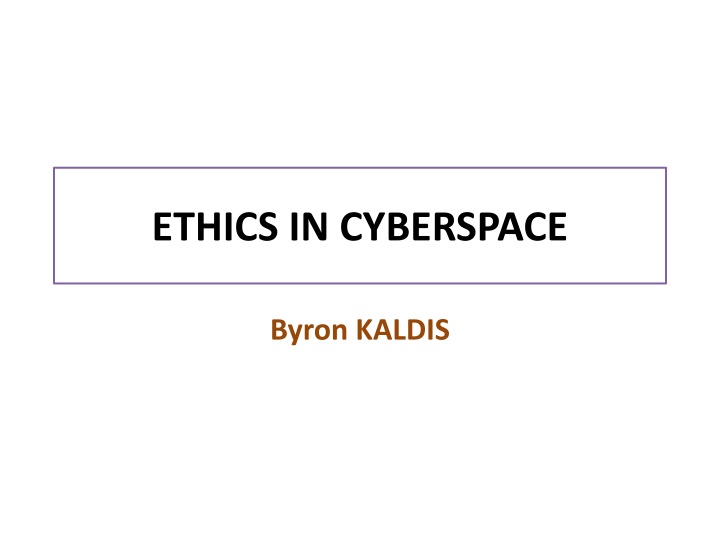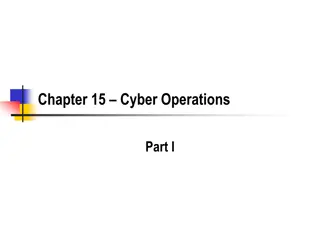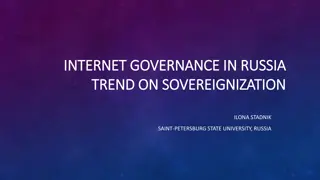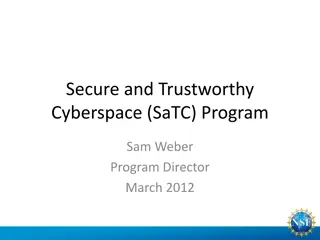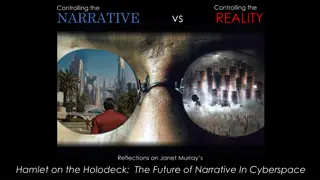ETHICS IN CYBERSPACE
The content delves into the evolution of ethics in cyberspace and robotics, exploring the historical context, current roles, and future possibilities for robots in society. Topics include the origin of the word "robot," changing perceptions of robot roles, and debates surrounding emotional capabilities in robots. The discussion extends to social robotics and the diverse tasks robots perform in various sectors, from labor and military to healthcare and companionship. Overall, the content offers insights into the ethical considerations and societal implications of advancing robotics technology.
Download Presentation

Please find below an Image/Link to download the presentation.
The content on the website is provided AS IS for your information and personal use only. It may not be sold, licensed, or shared on other websites without obtaining consent from the author.If you encounter any issues during the download, it is possible that the publisher has removed the file from their server.
You are allowed to download the files provided on this website for personal or commercial use, subject to the condition that they are used lawfully. All files are the property of their respective owners.
The content on the website is provided AS IS for your information and personal use only. It may not be sold, licensed, or shared on other websites without obtaining consent from the author.
E N D
Presentation Transcript
ETHICS IN CYBERSPACE Byron KALDIS
ROBOTETHICS Lecture 2: Ethics and Robotics
the word robot was coined for the first time nearly a century ago ( by Kerel Capek in his play of 1921 )
We can forecast that in the XXI century humanity will coexist with the first alien intelligence we have ever come into contact with robots. Roboethics Roadmap, European Robotics Research Network (EURON)
OLD ROLES for Robots In the past robots were thought to perform the three D s = jobs that are Dull, Dirty, or Dangerous (examples of such jobs) But! Now we can think of robots differently in more serious roles
NEW ROLES Robots as human replacements. More than mere tools, which cannot think and act independently, robots are able to serve in many old and new roles in society that are often impossible due to human frailties and limitations Semi- and fully-autonomous machines that could carry out those jobs more optimally. Beyond the usual three Ds, robots perform delicate and difficult surgeries, which are risky with shaky human hands. They can navigate inaccessible places, such as the ocean floor or the surface of Mars.
Even newer roles for robots Some argue that robots could replace humans in situations where emotions are liabilities, such as battlefield robots that do not feel anger, hatred, cowardice, or fear human weaknesses that often cause wartime abuses and crimes by human soldiers
Social Robotics Robots take their place in society in various tasks, helping execute jobs, and in a wide range of roles: Labor and Services Military and Security Research and Education Entertainment Medical and Healthcare Personal Care and as Companions Environment Future possibilities: autonomy & independent decision-making (war, driver-less cars or trains etc)
CHANGING NATURE OF ROBOT We may build nanobots (nanotechnology) swarms of which will work inside our bodies or in the atmosphere or cleaning up oil spills. Even rooms or entire buildings might be considered as robots beyond the smart homes of today they manipulate the environment in ways more significant than turning on lights and air conditioning. With synthetic biology, cognitive science, and nanoelectronics, future robots could be biologically based. And human-machine integrations, that is, cyborgs, may be much more prevalent than they are today, which are mostly limited to patients with artificial body parts, such as limbs and joints that are controlled to some degree by robotics. So: WHAT IS A ROBOT ? Very fuzzy definition of robot What we intuitively consider as robots today may change drastically tomorrow
Will future Robots exceed humans in capacities, including ethical ones? Will Robots be the evolution of a new species? Will future Robots require different ethical approaches to understand their behavior?
Ethical Issues in ICT (information-Computer Technologies) Dual-use technology (every technology can be used or misused) Anthropomorphization of machines Humanization of the human/machine relationship (cognitive and affective bonds toward machines) Technology addiction Digital divide, socio-technological gap (age, social layers, world areas) Fair access to technological resources Effects of technology on the global distribution of wealth and power Environmental impact of technology
EURON: Ethical Issues in Robot-ethics What is human? Post-human? Cyborg? Human life/artificial life Human intelligence/artificial intelligence Privacy versus traceability of actions Integrity of the person/perception of the human being Diversity (gender, ethnicity, minority) Freedom Human enhancement (physical, cognitive, nanotechnology) What is science/knowledge? Animal welfare
EURON Rules Respect for human dignity and human rights Equality, justice, and equity Benefit/harm analysis Respect for cultural diversity and pluralism Nondiscrimination and nonstigmatization Autonomy and individual responsibility Informed consent Privacy Confidentiality Solidarity and cooperation Social responsibility Sharing of benefits Responsibility toward the biosphere
In 1942, novelist Isaac Asimov formulated the Three Laws of Robotics in the short story Runaround: 1. A robot may not injure a human being, or through inaction, allow a human being to come to harm 2. A robot must obey the orders given it by human beings except where such orders would conflict with the First Law 3. A robot must protect its own existence as long as such protection does not conflict with the First or Second Law Later on Asimov added the Fourth Law (known as Law Zero): 4. No robot may harm humanity or, through inaction, allow humanity to come to harm.
Is robotethics the ethics of robots or the ethics of robotic scientists? Which kind of ethics is the correct one for Robotics? How contradictory is, on the one hand, the need to implement robotethics in robots, and, on the other, the development of robot autonomy? Can robots can exhibit a personality ? Do robots have consciousness? Can robots can express emotion ?
ETHICAL AND SOCIAL ISSUES Safety and Errors Law and Ethics Social Effects
What is a Robot? A Robot is only a Machine no consciousness no free will no emotions A Robot is a Moral Agent (not merely a moral patient) Despite not exhibiting consciousness or emotions Mind-less Morality (morality without necessarily mental activity)
How far can Ethics be relevant to Robots? Some Answers: Not at all Superficially or Simple Questions Deep Concerns
Personhood What is PERSONHOOD? What is person in a moral sense Can a Robot be a person/moral agent? Emotions & moral sentiments Necessary prerequisite? Evolution & moral decision-making Unconscious decision & movements (instincts) But also Higher cognitive Decision-making DELIBERATION
Deliberative cognitive system humans have when thinking & deciding morally Mental representation of alternatives Weighing + & - > costs and benefits Understanding rules & maxims Shunning (silencing) emotions
Morality without Instincts & Emotional reactions? Only Deliberation? Moral Beings without moral emotions Moral Beings with Rational Deliberative capacities Rational intelligence Moral intelligence SO ROBOTS MAY BE PERSONS in the moral sense
What about Freedom and Free-Will? additional requirement for moral personhood What is Free-Will? Do humans really have it? Can Robots have it? Consciousness The problem of consciousness how does it feel from the inside Humans, Freedom and Physics
Moral Machines K. Allen AUTONOMOUS ARTIFICIAL MORAL AGENTS More than agents whose actions have ethical impact but agents who are moral reasoners two dimensions: autonomy and sensitivity to morally relevant facts artificial agents might eventually attain genuine moral agency with responsibilities and rights, comparable to those of humans.
Systems with very limited autonomy and sensitivity have only operational morality, meaning that their moral significance is entirely in the hands of designers and users. As machines become more sophisticated, a kind of functional morality is possible, where the machines themselves have the capacity for assessing and responding to moral challenges. The creators of functional morality in machines face many constraints due to the limits of present technology.
Philosophers and Designers Top-down theories of Ethics Bottom-up Developmental approaches Recent Developments in Cognitive Sciences affect future approaches of how to build Artificial Moral Agents
Problems mention in MM or whose centrality we did not emphasize adequately. 1. Full moral agency for machines requires capacities or features we either did not 2. Some features required for full moral agency cannot be implemented in a computer system or robot. Robots will need a moral code that does not necessarily duplicate human morality. 3. The approaches we propose for developing AMAs are too humancentric. be friendly to humans (friendly AI) was not given its due in MM. 4. The work of researchers focused on ensuring that a technological singularity will 5. In focusing on the prospects for building AMAs, we imply that dangers posed by (ro)bots can be averted, whereas many of the dangers cannot be averted easily. In other words, MM contributes to the illusion that there is a technological fi x, and thereby dilutes the need to slow, and even stop, the development of harmful systems
5. In focusing on the prospects for building AMAs, we imply that dangers posed by robots can be averted, whereas many of the dangers cannot be averted easily. In other words, Moral Machines contributes to the illusion that there is a technological fix, and thereby dilutes the need to slow, and even stop, the development of harmful systems 6. The claim that the attempt to design AMAs helps us understand human moral decision making better could be developed more fully
